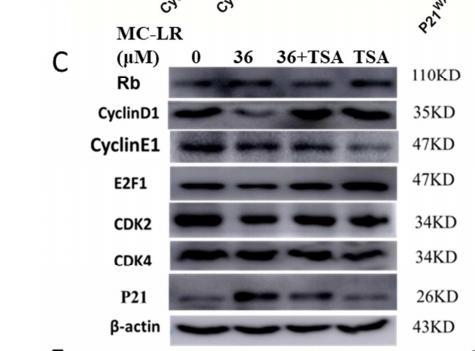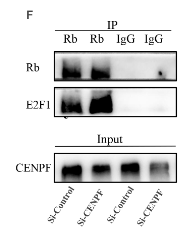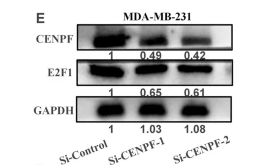| 产品: | E2F1 抗体 |
| 货号: | DF6797 |
| 描述: | Rabbit polyclonal antibody to E2F1 |
| 应用: | WB IHC |
| 文献验证: | WB |
| 反应: | Human, Mouse, Rat |
| 预测: | Pig, Bovine, Horse, Rabbit |
| 分子量: | 47,70kDa; 47kD(Calculated). |
| 蛋白号: | Q01094 |
| RRID: | AB_2838759 |
产品描述
*The optimal dilutions should be determined by the end user.
*Tips:
WB: 适用于变性蛋白样本的免疫印迹检测. IHC: 适用于组织样本的石蜡(IHC-p)或冰冻(IHC-f)切片样本的免疫组化/荧光检测. IF/ICC: 适用于细胞样本的荧光检测. ELISA(peptide): 适用于抗原肽的ELISA检测.
引用格式: Affinity Biosciences Cat# DF6797, RRID:AB_2838759.
展开/折叠
Dmel\CG6376; Dmel_CG6376; drosE2F1; E(Sev-CycE)3A; E(var)3-93E; E2-promoter binding facto; E2F 1; E2F transcription factor 1; E2F-1; E2f-PA; E2f-PB; E2f-PC; E2F1; E2f1 E2F transcription factor 1; E2F1_HUMAN; Evar(3)164; KIAA4009; l(3)07172; l(3)j3B1; l(3)j3C2; l(3)rM729; mKIAA4009; OTTHUMP00000030661; PBR3; PRB binding protein E2F 1; PRB-binding protein E2F-1; RBAP 1; RBAP-1; RBAP1; RBBP-3; RBBP3; RBP 3; RBP3; Retinoblastoma-associated protein 1; Retinoblastoma-binding protein 3; Transcription factor E2F1;
抗原和靶标
- Q01094 E2F1_HUMAN:
- Protein BLAST With
- NCBI/
- ExPASy/
- Uniprot
MALAGAPAGGPCAPALEALLGAGALRLLDSSQIVIISAAQDASAPPAPTGPAAPAAGPCDPDLLLFATPQAPRPTPSAPRPALGRPPVKRRLDLETDHQYLAESSGPARGRGRHPGKGVKSPGEKSRYETSLNLTTKRFLELLSHSADGVVDLNWAAEVLKVQKRRIYDITNVLEGIQLIAKKSKNHIQWLGSHTTVGVGGRLEGLTQDLRQLQESEQQLDHLMNICTTQLRLLSEDTDSQRLAYVTCQDLRSIADPAEQMVMVIKAPPETQLQAVDSSENFQISLKSKQGPIDVFLCPEETVGGISPGKTPSQEVTSEEENRATDSATIVSPPPSSPPSSLTTDPSQSLLSLEQEPLLSRMGSLRAPVDEDRLSPLVAADSLLEHVREDFSGLLPEEFISLSPPHEALDYHFGLEEGEGIRDLFDCDFGDLTPLDF
种属预测
score>80的预测可信度较高,可尝试用于WB检测。*预测模型主要基于免疫原序列比对,结果仅作参考,不作为质保凭据。
High(score>80) Medium(80>score>50) Low(score<50) No confidence
研究背景
Transcription activator that binds DNA cooperatively with DP proteins through the E2 recognition site, 5'-TTTC[CG]CGC-3' found in the promoter region of a number of genes whose products are involved in cell cycle regulation or in DNA replication. The DRTF1/E2F complex functions in the control of cell-cycle progression from G1 to S phase. E2F1 binds preferentially RB1 in a cell-cycle dependent manner. It can mediate both cell proliferation and TP53/p53-dependent apoptosis. Blocks adipocyte differentiation by binding to specific promoters repressing CEBPA binding to its target gene promoters. Positively regulates transcription of RRP1B.
Phosphorylated by CDK2 and cyclin A-CDK2 in the S-phase. Phosphorylation at Ser-364 by CHEK2 stabilizes E2F1 upon DNA damage and regulates its effect on transcription and apoptosis.
Acetylation stimulates DNA-binding. Enhanced under stress conditions such as DNA damage and inhibited by retinoblastoma protein RB1. Regulated by KAP1/TRIM28 which recruits HDAC1 to E2F1 resulting in deacetylation. Acetylated by P/CAF/KAT2B.
Nucleus.
Component of the DRTF1/E2F transcription factor complex. Forms heterodimers with DP family members. The E2F1 complex binds specifically hypophosphorylated retinoblastoma protein RB1. During the cell cycle, RB1 becomes phosphorylated in mid-to-late G1 phase, detaches from the DRTF1/E2F complex, rendering E2F transcriptionally active. Viral oncoproteins, notably E1A, T-antigen and HPV E7, are capable of sequestering RB1, thus releasing the active complex. Interacts with TRRAP, which probably mediates its interaction with histone acetyltransferase complexes, leading to transcription activation. Binds TOPBP1 and EAPP. Interacts with ARID3A. Interacts with TRIM28; the interaction inhibits E2F1 acetylation through recruiting HDAC1 and represses its transcriptional activity. Interaction with KAT2B; the interaction acetylates E2F1 enhancing its DNA-binding and transcriptional activity. Interacts with BIRC2/c-IAP1 (via BIR domains). The complex TFDP1:E2F1 interacts with CEBPA; the interaction prevents CEBPA binding to target genes promoters and represses its transcriptional activity. Interacts with RRP1B. Interacts with HCFC1. Interacts with KMT2E; the interaction is probably indirect and is mediated via HCFC1.
(Microbial infection) Interacts with human cytomegalovirus/HHV-5 protein UL123.
Belongs to the E2F/DP family.
研究领域
· Cellular Processes > Cell growth and death > Cell cycle. (View pathway)
· Cellular Processes > Cell growth and death > Cellular senescence. (View pathway)
· Human Diseases > Drug resistance: Antineoplastic > Endocrine resistance.
· Human Diseases > Infectious diseases: Viral > Hepatitis B.
· Human Diseases > Infectious diseases: Viral > Human papillomavirus infection.
· Human Diseases > Infectious diseases: Viral > HTLV-I infection.
· Human Diseases > Cancers: Overview > Pathways in cancer. (View pathway)
· Human Diseases > Cancers: Overview > MicroRNAs in cancer.
· Human Diseases > Cancers: Specific types > Pancreatic cancer. (View pathway)
· Human Diseases > Cancers: Specific types > Glioma. (View pathway)
· Human Diseases > Cancers: Specific types > Prostate cancer. (View pathway)
· Human Diseases > Cancers: Specific types > Melanoma. (View pathway)
· Human Diseases > Cancers: Specific types > Bladder cancer. (View pathway)
· Human Diseases > Cancers: Specific types > Chronic myeloid leukemia. (View pathway)
· Human Diseases > Cancers: Specific types > Small cell lung cancer. (View pathway)
· Human Diseases > Cancers: Specific types > Non-small cell lung cancer. (View pathway)
· Human Diseases > Cancers: Specific types > Breast cancer. (View pathway)
· Human Diseases > Cancers: Specific types > Hepatocellular carcinoma. (View pathway)
· Human Diseases > Cancers: Specific types > Gastric cancer. (View pathway)
文献引用
Application: WB Species: Rat Sample: testicular tissue
Application: WB Species: Human Sample: MDA-MB-231 cell
Application: WB Species: Human Sample:
Application: WB Species: Human Sample: MKN-28 cells
限制条款
产品的规格、报价、验证数据请以官网为准,官网链接:www.affbiotech.com | www.affbiotech.cn(简体中文)| www.affbiotech.jp(日本語)产品的数据信息为Affinity所有,未经授权不得收集Affinity官网数据或资料用于商业用途,对抄袭产品数据的行为我们将保留诉诸法律的权利。
产品相关数据会因产品批次、产品检测情况随时调整,如您已订购该产品,请以订购时随货说明书为准,否则请以官网内容为准,官网内容有改动时恕不另行通知。
Affinity保证所销售产品均经过严格质量检测。如您购买的商品在规定时间内出现问题需要售后时,请您在Affinity官方渠道提交售后申请。产品仅供科学研究使用。不用于诊断和治疗。
产品未经授权不得转售。
Affinity Biosciences将不会对在使用我们的产品时可能发生的专利侵权或其他侵权行为负责。Affinity Biosciences, Affinity Biosciences标志和所有其他商标所有权归Affinity Biosciences LTD.




